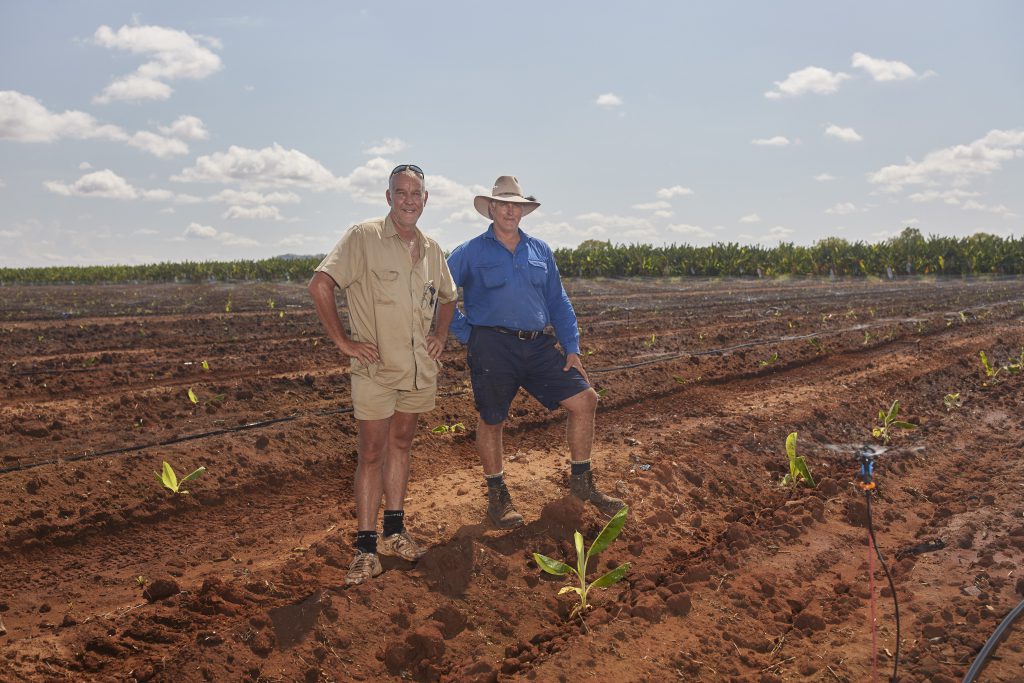The tropical semi-arid conditions of the Ord River in Kununurra certainly has its challenges when it comes to growing bananas. But Western Australia’s largest banana producer—Kimberley Produce—has taken on the task with gusto and with confidence in the future is now expanding its banana operations even further.

By Sonia Campbell
For the Dobson family, the gamble to return to banana production in the semi-arid Ord River region near Kununurra four years ago, is certainly paying off.
It wasn’t an easy decision though. Bananas were originally a staple crop for the dedicated farming family, who have operated Kimberley Produce in West Australia’s far northern Kimberley region, for the past 22 years.
The family, however, walked away from Australia’s favourite fruit in 2004—along with the majority of banana growers on the Ord—after the industry was almost decimated by severe storms.
“Twenty years ago we grew bananas in Kununurra and then we dropped bananas (in 2004) after we got hit by a lot of bad weather,” owner Stewart Dobson recounts.
“Then we went to red grape fruit, and they were a good crop, but we started ripping those out after an oversupply and we couldn’t get a good enough return on investment, so we went back to bananas in 2013,” he said.
Mr Dobson and his wife Rosalie manage Kimberley Produce with their sons Craig and Lachlan, who are now the main drivers of the company’s farming operations, which also includes mangoes, grapefruit and papaya.
The company has 75 hectares under banana production, making them WA’s largest banana producer. And, they are about to get even bigger.
They are currently undertaking a significant expansion of their banana plantations, thanks in part to receiving a grant under the national Coles Nurture Fund scheme.
This will assist the company in implementing innovative on-farm irrigation systems, plant densities, crop and nutrient monitoring, with a view to improve productivity.
The Coles Nurture Fund is investing $50 million over five years in grants and interest-free loans to Australian primary producers who have innovative ideas, to help them implement new market-leading products, technologies, systems and processes.
“We are going to use the grant to increase our banana plantings, by using a bit of innovative technology and management,” Mr Dobson said.
“Using things like innovative sprinkler systems, soil moisture monitoring, and a crop health drone to try and maintain the moisture and humidity within the plantation, as well as reducing evaporation. ”
“We farm on the Ord River, which is semi-arid tropics. We haven’t had any rain here since the 15th of April. We have had to rely on irrigation, but our annual evaporation rate normally is 4000mm per annum.”
“We’ve put in 75 hectares of bananas in the last four years and starting on October 1, we’ll now expand that to more than 100 hectares.”
Despite the harsh growing conditions, the Dobsons say they are still able to produce a high quality crop, which is currently in high demand. But it does come at a cost. On average they spend $1200 a hectare per year on irrigation, as they pump directly from the Ord River and use remote water monitors to ensure efficient water management across their cropping estate.
“The second main factor is plant density. We grow 2700 plants per hectare. Normally when you pick a bunch, you cut the tree and leave it on the ground. We don’t do that, we leave the plant to supply shade to maintain a full canopy and reduce heat stress.”
And their product speaks for itself.
The company produces about 375,000 cartons of banana each year and they have sold directly to Coles Kununurra since early 2016.
“Bananas are like all primary produce, they have their ups and downs, but we are fortunate that Coles are interested in our development and they have been buying our bananas through a direct contract for almost two years,” Mr Dobson said.
And it would appear the family is more than happy to be back in the banana business, describing it as one of their favourite crops.
“We like growing bananas. It’s a challenge, but growing anything on the Ord is a challenge. But provided you are prepared to think outside the square you can make it work.”
* For further information on the Coles Nurture Fund go to www.coles.com.au.
